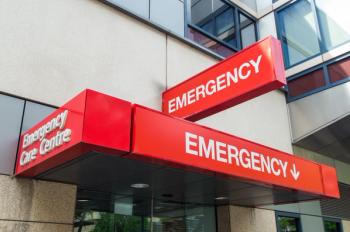
Focused Practice Designation in Emergency Behavioral Health
Key Takeaways
- The focused practice designation in emergency behavioral health was approved, recognizing expertise in emergency psychiatry through collaboration between emergency medicine and psychiatry boards.
- The FPD offers multiple certification pathways, including fellowship training and portfolio-based evaluation, enhancing professional recognition and career advancement.
Emergency psychiatry gains recognition with a new focused practice designation, enhancing collaboration between emergency medicine and psychiatry for better patient care.
SPECIAL REPORT: EMERGENCY PSYCHIATRY
In February 2025, the American Board of Medical Specialties (ABMS) Board of Directors approved the request from the American Board of Emergency Medicine (ABEM) to recognize expertise in emergency behavioral health (EBH) through a focused practice designation (FPD).1,2 This endeavor was the result of collaboration between ABEM and the American Board of Psychiatry and Neurology (ABPN) to offer this FPD to interested emergency physicians and psychiatrists, who both serve those most in need at the intersection of psychiatric crises and the emergency departments.
To operationalize this project, an Emergency Behavioral Health Task Force was established, and it had robust participation from ABEM, ABPN, and the American Association for Emergency Psychiatry (AAEP). From an AAEP perspective, this project has a fascinating history tied to our longitudinal interest in pursuing certification and/or fellowship in the specialty overlap between psychiatry and emergency medicine. This came to a tipping point when the AAEP was tasked by a formal action statement from the American Psychiatric Association (APA) Assembly to investigate all possible options in this educational arena.
That journey led AAEP leaders to speak to a multitude of psychiatric stakeholders (APA, ABPN, Academy of Consult Liaison Psychiatry, American Association of Directors of Psychiatric Residency Training, National Alliance on Mental Illness, etc) about possible options prior to combining forces with our emergency medicine colleagues. Consequently, we began further conversations with ABEM that led to synergy and the creation of a formal task force that would aim for certification chaired by ABEM with significant inputs from ABPN and AAEP.
This task force began with years of effort, including but not limited to: stakeholder engagement, curriculum development, application consolidation, consideration of maintenance ideals, and examination of parallels already being utilized in medical education.3 After deliberation on the aforementioned items, the decision was made to examine a FPD as opposed to a traditional fellowship. While the field of psychiatry has not utilized FPDs in the past, our emergency medicine colleagues are familiar with it as they have used it on items such as ultrasound specification.
Immediate advantages to the FPD include the ability to include multiple specialties (both psychiatry and emergency medicine have clear interest in this) as well as the ability to recognize physicians at different levels in their career. More specifically, the FPD has multiple pathways to enter for recognition. For instance, there are ways to enter through a possible fellowship training while also offering a separate pathway for application that would focus solely on one's history of working in the field of emergency psychiatry. These options should be made available to board certified emergency medicine and psychiatric physicians by 2026.
Another unique feature of this FPD is the fact that fund of knowledge will not be deferred to a traditional examination. In fact, expertise in this FPD will now be evaluated through a portfolio approach. The portfolio truly manifests the myriads of ways in which physicians demonstrate their professional skill set. In fact, during the presentation to the ABMS subcommittee known as COCERT (the Committee on Certification), their subject matter panelists noted their extensive interest in not only the portfolio approach but also that this effort includes multiple specialties working in tandem.
So, all that being said, a fair question would be…now what? Given the fact that many psychiatric organizations formally supported this project, how does this affect the field of psychiatry moving forward? From a practical standpoint, there are likely to be advantages to having the FPD in terms of recognition, tenure, professional advancement, compensation, and competitive differentiation when looking at desirable positions. From a systems standpoint, while my previous comments reflect on those who are already doing the work, there is likely even more to gain from those who will be new to the field and engage more with this vulnerable population due to said FPD.
During our development stages, I often commented to interested stakeholders that while some psychiatrists have interest in this field, all emergency medicine physicians have interest in the overlap between our 2 fields. When looking at how this can positively affect those for whom we care, we have impact at 2 levels. We are supporting the psychiatrists that have dedicated their career to this challenging milieu, while also making sure that psychiatric subject matter experts can train emergency medicine physicians who are markedly likely to see more of these emergencies nationwide due to staffing shortages.
From a personal standpoint, I am a psychiatrist who has spent most of my career within the world of emergency department psychiatry and psychiatric emergencies. As such, I am so proud of the advancements that groups such as the AAEP, ACEP, and APA have accomplished. The addition of this FPD signals to the greater medical world that this is not only an important section of our work, but it also deserves investment. This includes clinical, research, and academic support towards our mission and those we serve.
Dr Thrasher is the past president of the American Association for Emergency Psychiatry, the immediate past president of the Wisconsin Psychiatric Association, and the medical director of Milwaukee County Crisis Services.
References
1. New emergency behavioral health focused practice designation approved for ABEM. American Board of Emergency Medicine. February 26, 2025. Accessed March 18, 2025.
2. Wilson R. Emergency behavioral medicine granted focused practice designation. Becker’s Behavioral Health. February 28, 2025. Accessed March 18, 2025.
3. Thrasher T.
Newsletter
Receive trusted psychiatric news, expert analysis, and clinical insights — subscribe today to support your practice and your patients.







